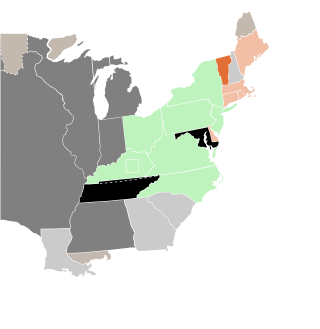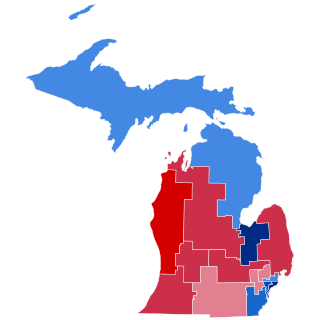These are tables of congressional delegations from Tennessee to the United States House of Representatives and the United States Senate.

The 2002 United States House of Representatives elections were held on November 5, 2002, in the middle of President George W. Bush's first term, to elect U.S. Representatives to serve in the 108th United States Congress. This was the first congressional election using districts drawn up during the 2000 United States redistricting cycle on the basis of the 2000 census.

The 1864–65 United States House of Representatives elections were held on various dates in various states between June 5, 1864, and November 7, 1865, in the midst of the American Civil War and President Abraham Lincoln's reelection. Each state set its own date for its elections to the House of Representatives. Members were elected before the first session of the 39th United States Congress convened on December 4, 1865, including the at-large seat from the new state of Nevada, and the 8 from Tennessee, the first secessionist state to be readmitted. The other 10 secessionist states had not yet been readmitted, and therefore were not seated.

The 1860–61 United States House of Representatives elections were held on various dates in various states between August 6, 1860, and October 24, 1861, before or after the first session of the 37th United States Congress convened on July 4, 1861. The number of House seats initially increased to 239 when California was apportioned an extra one, but these elections were affected by the outbreak of the American Civil War and resulted in over 56 vacancies.

The 1796–97 United States House of Representatives elections took place in the various states took place between August 12, 1796, and October 15, 1797. Each state set its own date for its elections to the House of Representatives. The size of the House increased to 106 seats after Tennessee became the 16th state to join the union. The first session of the 5th United States Congress was convened on May 15, 1797, at the proclamation of the new President of the United States, John Adams. Since Kentucky and Tennessee had not yet voted, they were unrepresented until the second session began on November 13, 1797.

Finis James Garrett was a United States representative from Tennessee and a Chief Judge of the United States Court of Customs and Patent Appeals.
Tennessee's 1st congressional district is the congressional district of northeast Tennessee, including all of Carter, Cocke, Greene, Hamblen, Hancock, Hawkins, Johnson, Sullivan, Unicoi, Washington, and Sevier counties and parts of Jefferson County. It is largely coextensive with the Tennessee portion of the Tri-Cities region of northeast Tennessee and southwest Virginia. With a Cook Partisan Voting Index rating of R+30, it is the most Republican district in Tennessee.

The 1994 United States Senate special election in Tennessee was held November 8, 1994. Incumbent Democratic Senator Al Gore resigned from the Senate following his election as Vice President of the United States in 1992, and this led to the 1993 appointment of Harlan Mathews and the subsequent special election. Mathews did not seek election to finish the unexpired term, and Representative Jim Cooper subsequently became the Democratic nominee. However, the Republican nominee Fred Thompson won the seat in a decisive victory.

The 1984 United States Senate election in Tennessee took place on November 6, 1984, to select the U.S. Senator from the state of Tennessee. Popular three-term Republican incumbent Howard Baker, who had served as United States Senate Majority Leader since 1981 decided not to seek re-election in order to concentrate on a planned bid for the 1988 Republican presidential nomination. This left the seat open.

The 1814–15 United States Senate elections were held on various dates in various states. As these U.S. Senate elections were prior to the ratification of the Seventeenth Amendment in 1913, senators were chosen by state legislatures. Senators were elected over a wide range of time throughout 1814 and 1815, and a seat may have been filled months late or remained vacant due to legislative deadlock. In these elections, terms were up for the senators in Class 1.

The 2002 congressional elections in Michigan were held on November 5, 2002 to determine who would represent the state of Michigan in the United States House of Representatives. Michigan had fifteen seats in the House, apportioned according to the 2000 United States census, causing it to lose a seat from the previous election when it had sixteen seats. Representatives are elected for two-year terms.

The 1796 United States House of Representatives election in Tennessee was held on October 15, 1796, to determine the first Congressman of Tennessee. Tennessee was admitted to the United States on June 1, 1796. Democratic-Republican candidate, Andrew Jackson defend his Nonpartisan opponent, James Roby, with 98.9% of the vote.

The 1894 United States elections was held on November 6, and elected the members of the 54th United States Congress. These were mid-term elections during Democratic President Grover Cleveland's second term. The Republican landslide of 1894 marked a realigning election In American politics as the nation moved from the Third Party System that had focused on issues of civil war and reconstruction, and entered the Fourth Party System, known as the Progressive Era, which focused on middle class reforms.

The 2016 United States House of Representatives elections in Tennessee was held on November 8, 2016, to elect the nine U.S. representatives from the state of Tennessee, one from each of the state's nine congressional districts. The elections coincided with the elections of other federal and state offices, including President of the United States. The primaries were held on August 4.

Elections in Tennessee are held to fill various local, state, and federal seats. Special elections may be held to fill vacancies at other points in time. Statewide legislative referrals and referendums may also be on the ballot in some elections. Tennessee is one of thirteen states that holds its presidential primaries on Super Tuesday.

Tennessee gained three seats in reapportionment following the 1820 United States census. Tennessee elected its members August 7–8, 1823, after the term began but before the new Congress convened.

The 2022 United States House of Representatives elections in Tennessee were held on November 8, 2022, to elect the nine U.S. representatives from the state of Tennessee, one from each of the state's nine congressional districts. The elections coincided with other elections to the House of Representatives, elections to the United States Senate, and various state and local elections.

Tennessee state elections in 2020 were held on Tuesday, November 3, 2020. Primary elections for the United States Senate, United States House of Representatives, Tennessee Senate, and Tennessee House of Representatives, as well as various judicial retention elections, were held on August 6, 2020.










